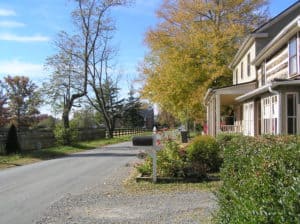 Unison
Unison
Unison, the southernmost of Loudoun’s Quaker villages, is located in southwestern Loudoun, between the towns of Middleburg and Round Hill. The village is surrounded by open fields, woods, horse and cattle farms and historic farm houses with views of the Blue Ridge visible from its tree-lined unpaved roads.
The village was settled in about 1740 by Quakers who had migrated down from Pennsylvania, via Maryland and across the Potomac to the fertile farmlands of Northern Virginia. In the late eighteenth and early nineteenth centuries, Unison (then called Union) grew rapidly as the County’s agricultural economy blossomed. In 1813 the village of Union was officially established by the General Assembly of Virginia and in 1817 it changed its name to Unison (another Virginia village called Union had a prior claim).
Unison became an important center in its area of Loudoun County with schools, hotels, taverns, homes and numerous businesses and a fine new Methodist Church built in 1832 by William Benton, Loudoun’s foremost architect.
In 1862, in the second year of the Civil War, Union and Confederate troops fought through the streets of the village as the huge Federal Army of the Potomac tried to cut off the Army of Northern Virginia from its sources of supply in Richmond after the terrible battle at Antietam.
Following the war, the village entered a long period of quiet stability.
Through the middle of the 20th century, Unison maintained itself as a viable village with its own churches, general store, and a famous saddle shop, and even a baseball team that played in the Loudoun baseball leagues. But, by the 1980s the town was in decline, too far away from the new highways that now carried the bulk of Loudoun's commerce and population.
By the 1990s the town had become little more than a sleepy residential enclave with only 50 permanent residents and 14 or so houses. The last retail enterprise, the Unison Store, a general store that had been in continuous business since 1880, closed in August 1996.
In 2001 a local group of residents formed a 501(c)(3) non-profit group, incorporated as "The Unison Preservation Society", with their stated goal to help protect and preserve the historic village and surrounding countryside of Unison.
As a result of their efforts the village of Unison was placed on the Virginia Landmarks Register in 2002 as the Unison Historic District, and on the National Register of Historic Places in 2003.
And, on Sept. 22, 2011, due to the research of Unison Preservation Society and the US National Park Service into the Civil War battles and skirmishes that had taken place in and around the Unison area, the 8,000-acre Unison Battlefield, with the village at its center, was successfully listed on the Virginia Landmarks Register and The National Register of Historic Places. It is considered one of the best preserved battlefields in Virginia.
Unison Heritage Day, celebrated close to the Fall anniversary of the three day Civil War battle, has become a major attraction in the area, luring hundreds of visitors to enjoy bluegrass music, barbecue, auctions and art shows with neighbors and friends.
The lovely village still has its notable United Methodist Church, its General Store has been restored and is used as the village’s community center and many of its historic homes have been restored. It is still surrounded by open fields, woods and horse farms and it is still traversed by the many windy, tree lined, unpaved roads that have served its residents for almost 300 years.